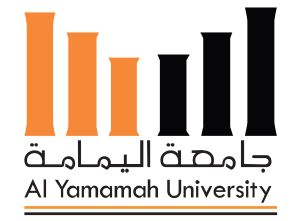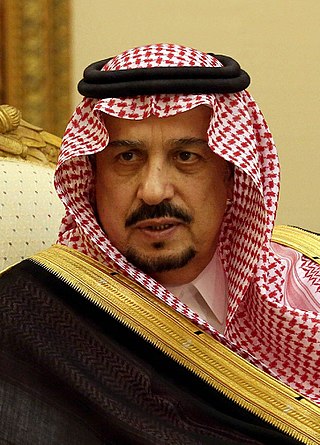
Riyadh, formerly known as Hajr al-Yamamah, is the capital and largest city of Saudi Arabia. It is also the capital of the Riyadh Province and the centre of the Riyadh Governorate.

Fahd bin Abdulaziz Al Saud was King and Prime Minister of Saudi Arabia from 13 June 1982 until his death in 2005. Prior to his ascension, he was Crown Prince of Saudi Arabia from 25 March 1975 to 13 June 1982. He was the eighth son of King Abdulaziz, the founder of modern Saudi Arabia.

Abdul Rahman bin Faisal Al Saud was the last emir of Nejd, reigning from 1875 to 1876 and from 1889 to 1891. He was the youngest son of Emir Faisal bin Turki bin Abdullah and the father of Abdulaziz, the founder of the Kingdom of Saudi Arabia.

Sultan bin Abdulaziz Al Saud, called Sultan the Good in Saudi Arabia, was the Saudi defense minister from 1963 to 2011 and the Crown Prince of Saudi Arabia from 2005 to 2011.
Al Oud Cemetery is a public cemetery in al-Oud, Riyadh, Saudi Arabia, known for being the resting place of many kings, crown princes and royals of the second and current Saudi states. The word "al-ʿŪud", in Peninsular Arabic means "elder ", likely referring to King Abdulaziz, who was buried in the cemetery.

The Saudi Press Agency is the official news agency of Saudi Arabia.

Muhammad bin Abdul Rahman Al Saud was an Arabian soldier and politician who played a role in the conquests of his half-brother Abdulaziz that led to the formation of the Kingdom of Saudi Arabia.

Bandar bin Abdulaziz Al Saud was the tenth son of King Abdulaziz. At the time of his death, he was the eldest surviving member of the ruling branch of the House of Saud.
Badr bin Abdulaziz Al Saud was a long-term deputy commander of the Saudi National Guard and a senior member of the Saudi royal family.

Al Yamamah University (YU) (Arabic: جامعة اليمامة) is a university based in Riyadh, Saudi Arabia and recognized by the Ministry of Higher Education. It was founded by Khalid bin Mohammed Al-Khudair from Al-Khudair Family, who in 1957 established Al-Tarbiyah Al-Namouthajiyah Schools (Arabic: مدارس التربية النموذجية), the first private schools in Riyadh.

Faisal bin Bandar bin Abdulaziz Al Saud is a Saudi royal who has served as the governor of Riyadh since 2015.
The Majalla, often directly transliterated as Al Majalla is a Saudi-owned, London-based political news journal published in Arabic, English and Persian. The magazine's headquarters in Saudi Arabia is in Jeddah.

Sayidaty is a weekly Arabic and a monthly English women's magazine published in both Riyadh and Beirut and distributed throughout the Middle East, North Africa, Europe and America.

Al Riyadh is a Riyadh-based, pro-government Saudi daily newspaper. Its sister paper was Riyadh Daily that was in circulation between 2003 and 1 January 2004. Al Riyadh is one of the dominant papers in Nejd.

Abdullah bin Abdulaziz Al Rabeeah is a Saudi pediatric surgeon. He has filled a number of supervisory and advisory roles in Saudi Arabia, including Minister of Health, Advisor to the Royal Court, and Supervisor General of the international aid agency KSrelief.
The following is a Gregorian timeline of the history for the city of Riyadh, Saudi Arabia.

Musaid bin Abdul Rahman Al Saud was a Saudi Arabian statesman and official who served as the Saudi Arabian minister of interior in 1960 and as the minister of finance from 1962 to 1975. A member of the House of Saud, he was the son of Abdul Rahman bin Faisal Al Saud and Amsha bint Faraj Al Ajran Al Khalidi. Prince Musaid was one of the younger half-brothers of King Abdulaziz and was one of the senior royals who shaped the succession of the rulers during his lifetime.
Saad bin Abdullah Al-Humaidin is a Saudi poet and journalist, born in Ta’if in 1947. Al-Humaidin holds a Teacher Institute diploma and has worked as a cultural literary editor for the Al-Riyadh newspaper.
Abdullah bin Muhammad bin Khamis, a Saudi researcher, writer and poet, was one of the most prominent writers interested in literature, history, geography, thought and culture in the Kingdom of Saudi Arabia.
Abd al-Aziz bin Ahmed al-Rifa'i, known as Abd al-Aziz al-Rifa'i was a Saudi writer and poet born in 1924 and died in 1993. He is considered one of the most important people in Saudi literature, and one of the creators of the cultural renaissance in the Kingdom during the twentieth century. He was hired as an adviser to the Royal Court with excellent rank in 1975 for six years and was chosen as a member in the Shura Council during the reign of King Fahd bin Abdulaziz. He was one of the contributors to the first Saudi Writers Conference, one of the founders of "Alam Al-Kutub" magazine, and the owner of "Dar Al-Rifai" for publishing, printing, and distribution which contributed to the publication of many references in literature, heritage, and history. He is considered the first general manager of the Al Yamamah Press Foundation and has published 20 books, including 3 collections of poetry.













